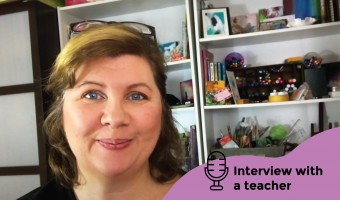Peer to peer tutoring is becoming increasingly popular all over the world due to its countless advantages and proven efficiency.
Peer to peer tutoring (PPT) in its traditional sense is a learning technique which allows students to tutor their fellow classmates.
This means that the friendship connections they make in lessons, the ease of understanding that comes with communicating with someone of a similar age and the confidence to ask questions all remain during their learning experience.
However, times are changing. With advancing developments in technology, rates of enrolment in online learning courses have skyrocketed. This has created the need for a new, upgraded type of peer to peer tutoring.
How has technology influenced peer to peer tutoring?
InfoDepot is a new online learning platform which offers the unique option to have live video and phone calls between teachers and students.

Live video or phone calls involve a real-time lesson involving a teacher with some knowledge about a subject and a learner, who is keen to gain knowledge about a particular topic. This allows a more direct, personal approach to learning and encourages students of different backgrounds and ages to form connections.
These connections develop as a result of the inevitable communication between the participants of the call. This type of interactive learning does not happen with the typical pre-recorded video classes offered by most online learning platforms, as students are merely listening to the information relayed in the video.
One amazing thing about this new kind of PPT is that the stigma surrounding older age students dissipates almost entirely. The average age of an online student is 32 years old. This means that all ages are welcome to learn about a subject or activity of their choice, not just young, college students.
Do you know the benefits of peer to peer tutoring?
Here are a few examples.
- Learning progression can be up to 5 months.
- It promotes active learning.
- Leads to higher levels of academic achievement.
- More financially efficient than paying for a traditional tutor.
- Interaction between students is a form of active learning, as students are not merely listening to information.
- Encourages the personal and social development of the individual.
- Facilitates friendships between teachers and learners.
- Urges learners to take charge of their own learning journey.
- Develops the communication skills of both the student and the teacher.
- Promotes learners to discover the most effective ways of learning.
- Tutoring can be tailored to a particular curriculum.
- It promotes lifelong learning.
- It allows mature learners to continue expanding their knowledge.
- People who have tried it also claim that it is a fun way to learn.
It is obvious that numerous benefits can be obtained from peer to peer tutoring. One key advantage to highlight is the cost-effectiveness of the method. Traditional tutoring can be rather expensive, while peer tutoring is likely to be much cheaper.
PPT also increases the accessibility of tutoring sessions for students from disadvantaged or working class backgrounds as well as mature students.
If you are a teacher and wish to start with peer to peer tutoring, there are a few things to consider before you begin.
6 things to know to get the most from peer to peer tutoring
#1 Reward system motivates learners to perform better
Good tutees are sometimes offered rewards such as raffle tickets. Research has shown that this can improve overall academic performance and grades. It can also motivate the learner to work harder to achieve their goals. The reward can also be a finished project or something that a student-created at the end of a lesson.
In this way, students can have a sense of accomplishment by actually creating something by using the knowledge they acquired during the lesson.
#2 Confidentiality and privacy is mandatory
It is important to ensure that tutors keep any information about their tutees (personal or related to the sessions) private. This is why InfoDepot makes sure that all sensitive and personal data such as phone numbers is kept private.

#3 Positive reinforcement helps a learner recognize his own potential and qualities
Teachers should provide positive feedback to the tutee whilst correcting any mistakes and explaining the logic involved in solving the question. This should not be done too many times however, as it could diminish its effect. If you are thinking about joining InfoDepot as a live tutor, make sure to think about how to implement positive reinforcement in your every live tutoring session.
#4 Active learning empowers students to achieve more
One of the most important strategies to promote when tutoring students is active learning. The students must be doing more than just listening to information. They must take learning into their own hands.
Tutors should encourage students to ask questions and initiate discussions, as this is one particularly effective way to facilitate learning and encourage students to take charge of their learning journey.
By using the InfoDepot tutoring option (via phone or via video), students are encouraged to be proactive and ask questions that can truly make a difference in their learning journey.

#5 Effective feedback supports learners skills development
Feedback is critical for learning development. Tutors must be able to give critical feedback to the students so that they can fill the gaps in their knowledge, explore the areas that they find difficult in more depth and consequently improve their marks in the future.
With live tutoring calls at InfoDepot, this can be done efficiently. You as a teacher can make notes during your tutoring calls and to implement them for any future tutoring sessions.
#6 Non-directive tutoring enhances proactive involvement
Tutors should learn to help and guide students towards the correct answer, rather than merely provide it to them. This increases their ability to think critically, improve the way that they learn in the future and also will boost their confidence in themselves as they reach the correct answer.
Teaching is at its most effective when guidance and encouragement leads to the correct answer, not when the answers are provided for them.
When a student asks for help on InfoDepot live tutoring calls, you can actually guide them and help them find answers on their own. In this way both you and your student will be able to benefit from live tutoring.
In conclusion,
Peer to peer tutoring can have many favourable benefits related to academic success and personal development whilst also solving many cost-related problems.
Teachers can also tailor the virtual lesson to the tutee in order to cover any topics they find difficult in more detail.
Many teachers also claim that online PPT improves their teaching methods, as it is easier to initiate discussions and discern which methods the student best responds to.
Peer to peer tutoring is not widely offered on online e-learning platforms. Start your learning journey today and form new connections with our unique learning feature on InfoDepot.





Comments